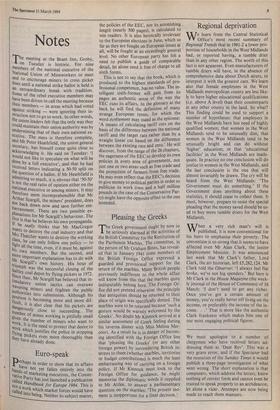Euro-speak
Perhaps in order to show that its affairs have not yet fallen entirely into the hands of marketing executives, the Conser- vative P- arty has just launched a publication called Handbook for Europe 1984. This is not a work which market forces would have called into being. Neither its subject matter, the policies of the EEC, nor its astonishing length (nearly 300 pages), is calculated to win readers. It is also heroically irrelevant to the European elections in June, which so far as they are fought on European issues at all, will be fought at an exceedingly general level. No other European party has felt a need to publish a guide of comparable detail, let alone send it free of charge to all sixth forms.
This is not to say that the book, which is produced to the highest standards of pro- fessional competence, has no value. The in- telligent sixth-former will gain from its pages an authentic sense of the way the EEC runs its affairs. In the glossary at the back he will find the definition of many strange European terms, for which the word ecretement may stand as the epitome: 'A means of calculating tariff cuts on the basis of the difference between the national tariff and the target rate rather than by a straight linear cut based on the difference between the existing rate and zero.' He will discover, from the range of the 26 chapters, the eagerness of the EEC to develop its own policies in every area of government, not just one or two areas such as free trade and the protection of farmers from free trade. He may even reflect that the EEC's decision to give money to political parties in order to publicise its work (two and a half million pounds in the case of the Conservative Par- ty) might have the opposite effect to the one intended.














































 Previous page
Previous page